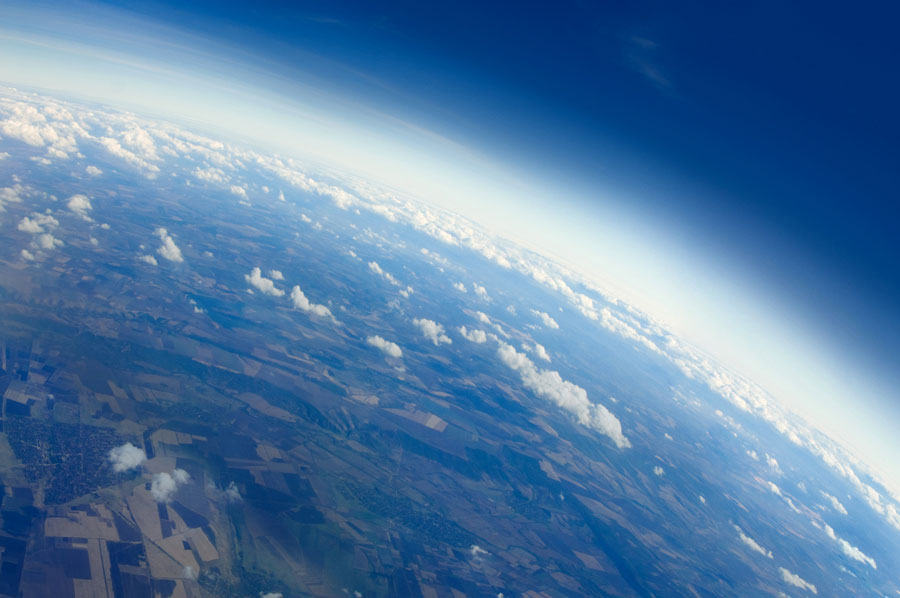The views expressed in our content reflect individual perspectives and do not represent the authoritative views of the Baha'i Faith.
All created things are interlinked in a chain leading to spirituality and ultimately ending in abstract realities. – Abdu’l-Baha, Mahmud’s Diary, p. 66.
A few weeks ago, the Astrophysical Journal published an astonishing number: two trillion. As in galaxies.
Talk about an abstract reality! Can you imagine it?
No, you can’t. It’s highly doubtful that anyone could possibly fathom the sheer size of that number. A million is a thousand thousands; a billion is a thousand millions; and a trillion is a thousand billions.
Here’s one way to try and visualize it: if you stacked up two million dollars’ worth of thousand dollar bills, it would be 8 inches high. If you stacked two billion dollars’ worth, it would be 692 feet high, about the height of a 70-story skyscraper. If you stacked two trillion dollars’ worth, it would be 126 miles high—beyond Earth’s atmosphere and far out into space.

Or, if that analogy doesn’t quite do it for you, think about it this way: if you count backwards, two million seconds equals 24 days ago. Two billion seconds: 62 years ago. Two trillion seconds? 64,000 BC.
So we can count to two trillion, but the very idea of two trillion galaxies—galaxies!—becomes a completely abstract reality in our minds, something no one can possibly envision or imagine. Like trying to imagine God, our finite human consciousness simply cannot encompass anything so infinite.
Just last year scientists thought, based on all the scientific evidence and calculations we were capable of at the time, that our universe contained somewhere in the neighborhood (and a very large neighborhood it is) of 500 billion galaxies (/have-we-discovered-another-civilization-in-space) But, hey—science marches on. Now we know that figure has increased exponentially, to the unimaginable new number of two trillion. In another few years, we may find out, with the aid of the new James Webb Space Telescope scheduled to launch in 2018, that the number of galaxies in our vast universe goes far beyond the current two trillion guesstimate, and exceeds anything we could ever hope to measure—ultimately ending, once more, in an abstract reality.
Just to give you a glimmering of an idea about all this, a small galaxy, called a dwarf, has maybe a few billion stars. Our home galaxy, the Milky Way? It holds maybe somewhere on the order of 100-400 billion stars, and at least an estimated hundred billion planets. Up until the 1920s, scientists all over the world were absolutely convinced that the Milky Way was the only galaxy in the entire universe—because our rudimentary instruments wouldn’t allow us to see beyond the Milky Way. Now, we’ve expanded our vision a bit. We can see much farther into the void, and we’ve learned, for instance, that giant galaxies have a hundred trillion stars—because we can now see a few million giant galaxies.
Just try, for a moment, to fit that fact into your mind. See if you can expand your thinking enough to hold such a gigantic conception in one thought.
OK, got it? You’re picturing two trillion galaxies? Alright, then, how many stars are there in those galaxies?
The question doesn’t have a specific answer, because our technology won’t allow us to count them—and more importantly, because we don’t know if the universe is even finite. According to broad scientific estimates, the Earth contains 700 quintillion, five hundred quadrillion grains of sand on every beach and desert on the planet—for you mathematicians, that’s 7.5×10 to the 18th power. How many stars? A rough estimate, made even before we discovered the fact of two trillion galaxies, says maybe seven sextillion stars exist—at least ten times more than all those grains of sand. Next time you’re on the beach, give that some thought: seven sextillion suns.
Seven sextillion suns. Kind of hurts your brain to think about it, right?
The man who gave us the staggering new estimate of two trillion galaxies, an astrophysicist named Christopher Conselice from England’s University of Nottingham, leads a team of scientists who spent years analyzing sky surveys from the Hubble Space Telescope and other instruments. As the team star-gazed, they looked back through 13 billion years of time. (The farthest and oldest galaxies we can see probably aren’t even in the same places anymore, because galaxies move and because their extreme distance means their light takes 13 billion years to reach Earth.) Then the University of Nottingham astrophysicists built models and attempted to mathematically calculate the number of galaxies. That’s how they came up with two trillion.
“It’s much bigger than anyone would have guessed,” Dr. Conselice said, in the understatement of the millennium, “and the real number could be even higher.”
So here’s the obvious question all this raises: how big is the universe? As we develop the ability to see deeper and deeper into our universe, will we need to keep increasing our rough estimates of its size and the massive, inconceivable numbers of stars and galaxies it can hold? Is the universe infinite?
According to the Baha’i teachings, the answer is yes:
…thy Lord hath created in these vast heavens manifold bodies without limit or number, which the minds of men can neither compute nor encompass. Souls are bewildered when they attempt to understand them and confounded by a mere glimpse of them. – Abdu’l-Baha, the Tablet of the Universe, provisional translation.
…just as the luminous spiritual worlds are sanctified above computation or limitation, so too are the physical worlds in this vast immensity of space. – Ibid.
So all of these calculations, even as scientists continue to make them, will need to be continually revised upward—which proves that the vastness of the universe, “sanctified above computation or limitation,” ultimately ends in an abstract reality, a reflection of its Creator.
You May Also Like
Comments

















It hasn't happened yet but I hold out hope that one day a contact or a friend will message me something along the lines of "I read that article you shared from Baha'i teachings.org and it really made me think, I'd like to talk ...to you about it when you have some time..."
The prospect of receiving such a message in times like these is so tantalising.
Allah'u'Abha!